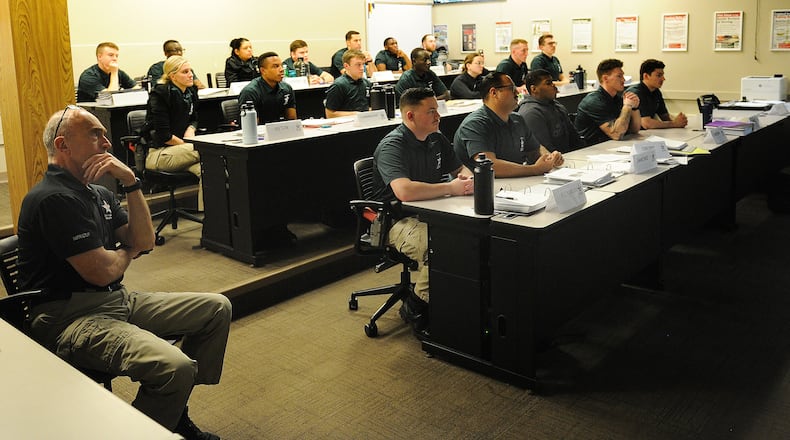Arrest, search and seizure are among the most fundamental powers and responsibilities of law enforcement. Through book learning about constitutional case law and classroom demonstrations, they were recently the subject of study for cadets at the Sinclair Police Academy.
“The Fourth Amendment is probably the most important you’ll deal with,” said Sinclair Police Academy instructor Randy Warren, who is also retired from the Dayton Police Department. “Be firm, be fair, be nice. We don’t judge anyone on anything other than conduct and behavior.”
The Fourth Amendment protects Americans from unreasonable searches and seizures by law enforcement, and establishes that police officers must have probable cause to get a warrant, and that the warrant must be specific about what is being searched and seized.
The “reasonable” part is key. Constitutionally, police have a right to detain a person for a brief investigation on reasonable suspicion of criminal activity.
A person is “seized” when in light of all circumstances, a reasonable person would believe that the person was not free to leave.
This may even boil down to the person feeling like they’re not free to leave. Even in a situation where an officer is making an arrest, communication and de-escalation help ensure the safety not only of the suspect, but the responding officer.
“You have to be a people person,” Warren said. “It’s not just what we do, but how we do it. It’s not just what we say, but how we say it.”
Warren demonstrated this in class by having two cadets confront a third by blocking his path, thus causing him to be “seized,” compared to a cadet or officer walking alongside a suspect while the third is standing off to the side, which would not.
The Buckeye State features heavily in the book learning.
Of the Supreme Court rulings that have become established law enforcement case law, a fair share of them come out of Ohio. Terry v. Ohio, a landmark Supreme Court decision, saw the court rule that it is constitutional for American police to “stop and frisk” a person they reasonably suspect to be armed and involved in a crime.
Beck v. Ohio, another Supreme Court decision, created one of the standards by which law enforcement determines probable cause: i.e. that the facts and circumstances were enough to lead a prudent or reasonable person to conclude a crime was committed.
Police also use the “reasonable expectation of privacy” standard. People have a reasonable expectation of privacy depending on where they are. The highest level of privacy someone can expect is in their own home, or “the castle,” Warren said, but that reasonable expectation of privacy changes or decreases as one goes out in public, for example.
Though police are not trained in cybercrimes in the academy, or search and seizure of phones and digital accounts, it’s worth noting that citizens have functionally no reasonable expectation of privacy with online posts or chats, Warren said.
A 2012 New York District Court ruling in United States v. Meregildo found that someone posting to his Facebook profile had “no justifiable expectation that his ‘friends’ would keep his profile private.” Other case law on the subject is emerging.
“You don’t really stop learning, and frankly you shouldn’t,” Warren told cadets.
About the Author

